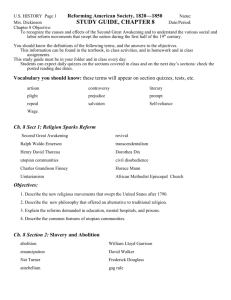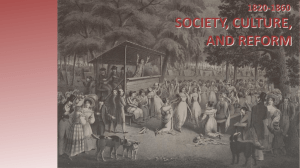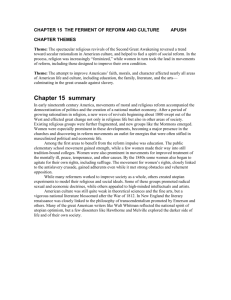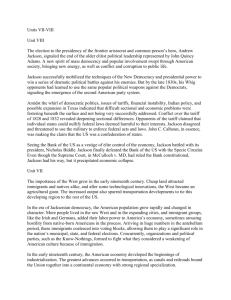November 18, 2011 AP US History Agenda New Nation/Era of Good
advertisement
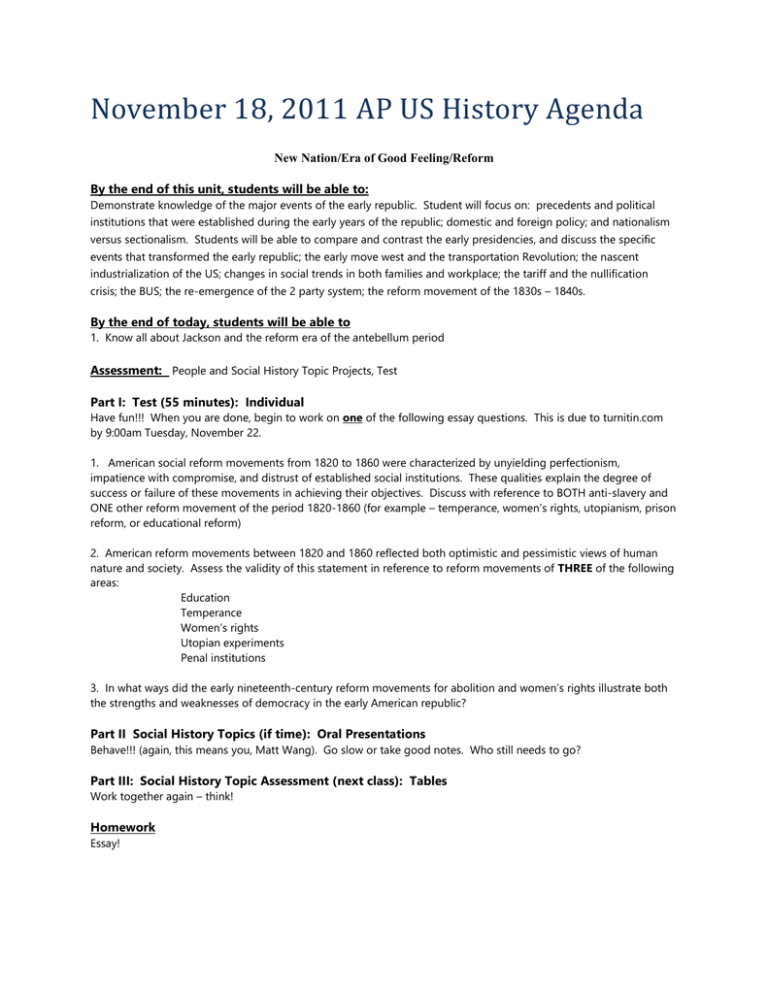
November 18, 2011 AP US History Agenda New Nation/Era of Good Feeling/Reform By the end of this unit, students will be able to: Demonstrate knowledge of the major events of the early republic. Student will focus on: precedents and political institutions that were established during the early years of the republic; domestic and foreign policy; and nationalism versus sectionalism. Students will be able to compare and contrast the early presidencies, and discuss the specific events that transformed the early republic; the early move west and the transportation Revolution; the nascent industrialization of the US; changes in social trends in both families and workplace; the tariff and the nullification crisis; the BUS; the re-emergence of the 2 party system; the reform movement of the 1830s – 1840s. By the end of today, students will be able to 1. Know all about Jackson and the reform era of the antebellum period Assessment: People and Social History Topic Projects, Test Part I: Test (55 minutes): Individual Have fun!!! When you are done, begin to work on one of the following essay questions. This is due to turnitin.com by 9:00am Tuesday, November 22. 1. American social reform movements from 1820 to 1860 were characterized by unyielding perfectionism, impatience with compromise, and distrust of established social institutions. These qualities explain the degree of success or failure of these movements in achieving their objectives. Discuss with reference to BOTH anti-slavery and ONE other reform movement of the period 1820-1860 (for example – temperance, women’s rights, utopianism, prison reform, or educational reform) 2. American reform movements between 1820 and 1860 reflected both optimistic and pessimistic views of human nature and society. Assess the validity of this statement in reference to reform movements of THREE of the following areas: Education Temperance Women’s rights Utopian experiments Penal institutions 3. In what ways did the early nineteenth-century reform movements for abolition and women’s rights illustrate both the strengths and weaknesses of democracy in the early American republic? Part II Social History Topics (if time): Oral Presentations Behave!!! (again, this means you, Matt Wang). Go slow or take good notes. Who still needs to go? Part III: Social History Topic Assessment (next class): Tables Work together again – think! Homework Essay! Tentative Unit at a glance – Remember, this can change at any time! Friday 10/21: Chapter 9 assignment, Monroe Tuesday 10/25: Chapter 9 assignment, JQA, Jackson Thursday 10/27: More Jackson Monday 10/31: Chapter 9 assignment due, Chapter 9 quiz, Jackson Wednesday 11/2: Jackson Quiz, Speed Dating and Social History Topics Assignment Friday 11/4: Jackson Quiz, Work on projects – Person due November 10, Topic due November16 Thursday 11/10: Speed Dating Monday 11/14: Finish Speed Dating, Move onto Social History Topics Presentations Wednesday 11/16: Finish all projects – complete processing work on the projects Friday 11/18: Test chapters 9-12 This Day in History 1820 Captain Nathaniel Palmer discovered Antarctica. 1883 Standard time began in the United States. 1886 1928 1976 1978 Chester A. Arthur, the 21st president of the United States (1881–1885), died in New York at 56. Mickey Mouse made his debut in Steamboat Willie. Spain's parliament approved a bill to establish a democracy after 37 years of dictatorship. Jim Jones, a U.S. pastor, led 914 of his followers to their deaths at Jonestown, Guyana, by drinking a cyanide-laced fruit drink. Cult members who refused to swallow the drink were shot. 2003 The Massachusetts Supreme Court ruled 4-3 that the right to same sex marriage was guaranteed by the state constitution. 2004 The UN Security Council held a two-day session in Nairobi. This was the first time it had convened outside of New York headquarters. (Because girls rock!!!)
